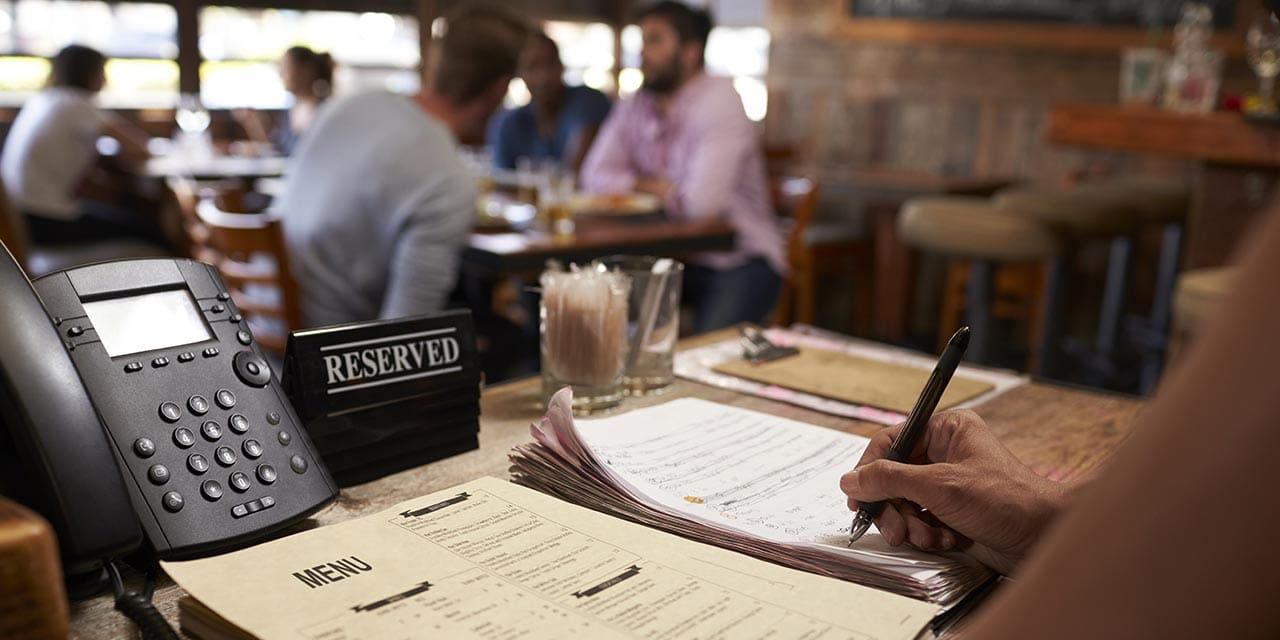As the first restaurant employee that guests interact with, restaurant Hostesses play a key role in shaping their satisfaction.
Positive and welcoming Hostesses can make guests feel appreciated and eager to return again.
Read on to find out how to be a good Hostess at a restaurant so you can succeed in this career.
What You Need To Know About Being a Hostess
The role of a restaurant Hostess is very dynamic — it influences various parts of the dining experience.
Handling multiple responsibilities at once, a Hostess acts as a greeter, organizer, problem-solver and communicator all in one.

The main responsibilities of a Hostess include managing reservations, greeting and seating guests upon arrival and monitoring the dining room.
Attentiveness to customers’ needs is essential for this role, whether it's answering questions or assisting Servers when the dinner rush hits.
During busy times and high-pressure situations, Hostesses need to be able to stay calm and quickly solve issues as they arise to keep everything running smoothly.
Ultimately, they play a crucial role in creating a positive atmosphere that enhances the overall dining experience.
How To Be a Good Restaurant Hostess: 12 Tips and Tricks for Success
Whether you’re applying to be a Hostess for the first time or already working as one, here are the things you need to do to thrive in this role.
1. Understand the restaurant layout and dynamics
You won’t be able to seat guests efficiently without knowing the restaurant's floor plan like the back of your hand.
A good seating strategy helps maximize the establishment's capacity without overburdening Servers.
It also contributes to the overall ambiance, ensuring guests are placed in appropriate sections that match their mood or occasion.
2. Familiarize yourself with the menu
As a Hostess, you are often the first person guests will approach with questions about the menu.
By being familiar with the dishes, ingredients and specials, you can confidently provide recommendations and answer any questions.
3. Stay organized
A tidy and well-organized Hostess stand or front area can make a huge difference during busy hours.
When your workstation is cluttered, you’re more prone to misplace reservations or seating arrangements, which can lead to chaos.

Keep your space neat and ensure menus, seating charts and reservation lists are up to date.
Good organization will help you stay efficient, giving you more time to focus on assisting guests.
4. Maintain a positive attitude
Even though your shift may be challenging and hectic, try to let optimism carry you through it.
Even if you're not in the best mood, try not to let it show, as the energy you bring can influence the atmosphere around you.
By staying upbeat, you'll not only enhance the guests' experience but also help keep your coworkers motivated and engaged.
Even during high-stress hours, keeping a friendly and approachable demeanor helps reassure guests and staff alike.
Practicing mindfulness techniques, deep breathing or taking brief moments to reset can help manage stress and maintain composure during peak hours.
5. Handle reservations and waitlists
Efficiently managing reservations and waitlists is crucial for a hostess. This involves accurately recording bookings, providing realistic wait times to guests and ensuring timely seating.
Proficiency with reservation systems and clear communication with both the kitchen and serving staff are essential to maintain a smooth flow of service.
6. Form bonds with guests
Take the time to remember the names and preferences of returning guests.
This level of personalized service will make them feel valued and appreciated, which can encourage loyalty and positive reviews.

In higher-end establishments, knowing a guest’s preferred table or favorite drink can make their visit even more memorable. As a result, you can also get bigger tips!
Some restaurant Hosts/Hostesses even go the extra mile by remembering the birthdays or wedding anniversaries of regular customers. While this usually isn’t a must-do, it can certainly make a difference as well.
7. Stay present
If you want to be a good Hostess, you need to be present at all times.
This means you should avoid distractions during your shift, such as checking your personal phone. (Yes, this includes times when there aren’t a lot of customers).
To many people, you may come off as unwelcoming or disinterested because of that.
Instead, use the downtime to tidy your workstation up, drink some water, check on reservations or assist other team members.
8. Communicate clearly and openly
Clear communication is one of the most important skills for a restaurant Host/Hostess.
You must keep the guests informed about wait times or delays as well as coordinate with Servers to ensure smooth service.
By communicating openly and keeping everyone in the loop, you will reduce the likelihood of guest complaints and frustration. Not to mention, you’ll help create an environment where everyone feels valued.
When talking to guests, also pay attention to your body language and tone of voice — these should exude calm confidence, even in tricky situations.
Regular briefings with the kitchen and serving staff about daily specials, menu changes and potential allergens are essential.
Utilizing tools like reservation management software can aid in tracking table statuses and coordinating with the team.
Effective communication also involves providing timely updates to Servers about new seating plans and informing the kitchen of large parties or special requests to ensure preparedness.
9. Be mindful of guests' needs
Paying attention to guests’ needs and the little details makes all the difference.
Here are some things you should and shouldn’t do:
- Don’t seat larger parties in cramped areas.
- Avoid seating older adults in uncomfortable chairs or areas that are hard to reach (e.g., require taking the stairs).
- Make sure families with kids have enough room for strollers or high chairs, and away from stairs.
- Keep an eye out for guests who might need assistance or have special requests, and be ready to help.
- Pay attention to lighting, open windows and noise levels to ensure everyone has a pleasant dining experience.
10. Assist with special needs and requests
A top-notch hostess is attentive to guests' special needs and requests, such as dietary restrictions, accessibility requirements or seating preferences.
Being proactive in accommodating these needs — like arranging wheelchair-accessible seating or noting food allergies — demonstrates empathy and enhances guest satisfaction.
Maintaining a record of regular guests' preferences can also contribute to a personalized and welcoming experience.
11. Learn from experience
Mistakes will happen. Rather than dwelling on them, see each one as an opportunity to grow.
Every shift will teach you something new, whether it’s how to handle complex seating arrangements or how to calm a frustrated guest.
The more hosting experience you have, the more confident you’ll become when it comes to handling various situations.
12. Make sure your appearance reflects professionalism
As the first point of contact for guests, you set the tone for the establishment through your appearance and demeanor.
That’s why you should maintain a spotless, polished attire, tidy hair and minimal accessories to project a professional image.

Moreover, make sure your composure conveys pride in your role and workplace. This can include keeping an upright posture and maintaining good eye contact when talking to guests in person.
See also: How Old Do You Have To Be To Be a Restaurant Hostess?
Training Resources and Certifications for Aspiring Hosts and Hostesses
If you truly want to thrive as a Hostess, consider working on your skills by using available training resources.
Many hospitality courses offer insights into customer service, conflict resolution and restaurant management. Here are some of them:
| Course | Provider | Type | Description |
| Managing Customer Conflict in Hospitality | High Speed Training | Online | Teaches conflict resolution strategies specific to hospitality, helping staff manage customer complaints effectively |
| Customer Service Excellence | Alison | Online | Teaches the fundamentals of providing excellent customer service, focusing on communication and problem-solving skills |
| Food Safety Certification | ServSafe | In-Person/Online | Essential training on food safety practices to ensure compliance with health regulations |
| Communication Skills Courses | Coursera | Online | Focuses on verbal and non-verbal communication techniques crucial for front-of-house staff |
| Time Management for Professionals | Udemy | Online | Teaches time management techniques to enhance efficiency and organization in a fast-paced environment |
| Hospitality Front of House Essentials | Typsy | Online | Focuses on essential skills for front-of-house staff, including etiquette, service styles, and guest interactions |
| Customer Relationship Management courses | edX | Online | Focuses on creating positive experiences for customers through effective service delivery |
And don’t forget YouTube — you can find videos that can teach you more about how to be a good Hostess at a restaurant.
Look for videos that cover topics like front-of-house etiquette, time management and communication techniques.
Here’s an example:
Career Growth Opportunities for Hostesses
While the Hostess role is often an entry-level one, it can open other doors in the hospitality industry.
With time and experience, you can advance into higher-level roles such as Assistant Restaurant Manager, Event Planner or Restaurant Marketing Manager.
By using the tips we’ve shared about how to be a good Hostess at a restaurant, you’re not only setting yourself up for success in this role — you’re also laying the groundwork for future career growth.
Advance Your Hospitality Career With OysterLink
Whether you're just beginning your journey as a Hostess or looking to build a long-term career in hospitality, having the right tools and guidance makes all the difference.
OysterLink connects job seekers with top hospitality employers, offering a dedicated job board where you can find Hostess positions, front-of-house roles and opportunities across hotels and restaurants.
Beyond job listings, OysterLink provides:
- Expert career guides tailored to hospitality roles
- Training resources to help you improve customer service, communication and management skills
- Industry insights to support your growth and confidence on the job










Loading comments...